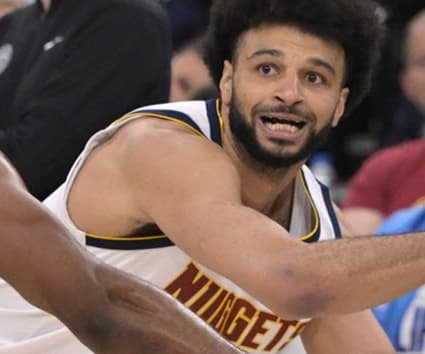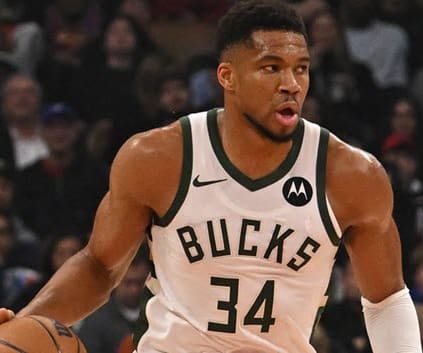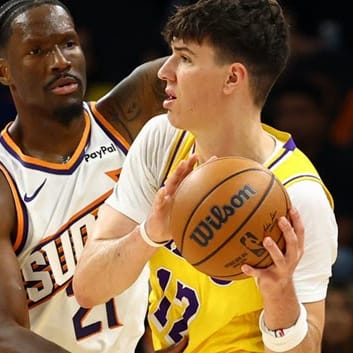2025 Stats
PTS
13.0
REB
6.5
AST
1.3
STL
0.6
BLK
0.2
ROS Projections
2025 Fantasy Outlook
Portis once again served as the Bucks' top option off the bench for the 2024-25 season, though he did end up starting in seven games when Giannis Antetokounmpo was forced to sit due to injury. Portis did miss 25 regular-season games after being suspended for violating the NBA's anti-drug policy. Still, he quickly found his form in his return and averaged 14.9 points, 8.6 rebounds, 1.1 assists and 0.8 steals over 30.3 minutes per game over his last eight games (including five playoff contests). Although the Bucks waived Damian Lillard and allowed Brook Lopez to sign with the Clippers, they committed to Portis with a three-year, $44 million contract, which solidifies him as Milwaukee's first big man off the bench behind Antetokounmpo and new starting center Myles Turner. It is worth noting that Portis shot 46.6 percent from the field and 36.5 percent from three-point range last season, both his worst marks since the 2019-20 season as a member of the Knicks. Read Past Outlooks

Enters starting five Tuesday
Portis is in the Bucks' starting lineup against the Timberwolves on Tuesday.
ANALYSIS
Portis will make his sixth start of the season Tuesday due to the absence of Myles Turner (illness). As a starter this season, Portis is averaging 16.4 points, 9.4 rebounds, 1.6 assists, 1.6 threes and 0.8 steals over 31.7 minutes per game.
Portis will make his sixth start of the season Tuesday due to the absence of Myles Turner (illness). As a starter this season, Portis is averaging 16.4 points, 9.4 rebounds, 1.6 assists, 1.6 threes and 0.8 steals over 31.7 minutes per game.
NBA Per Game Stats
Per Game
Total
Per 36
NBA Per Game Stats
Loading Per Game Stats...
2025 NBA Game Log
2025
2024
2023
2022
2021
2020
2019
2018
2017
2016
2025 NBA Per Game Split Stats
Schedule
By Month
Starting/Off Bench
Days Rest
Vs Opp
By Result
2025 NBA Per Game Split Stats
Loading Split Stats...
Advanced Stats
Loading Advanced Stats...
Stat Review
2025
2024
2023
2022
2021
2020
2019
2018
2017
2016
How does Bobby Portis compare to other players?
This section compares his stats with all players from the previous three seasons (minimum 200 minutes played)*. The bar represents the player's percentile rank. For example, if the bar is halfway across, then the player falls into the 50th percentile for that stat and it would be considered average.
True Shooting %
58.8%
Effective Field Goal %
57.8%
3-Point Attempt Rate
38.0%
Free Throw Rate
9.2%
Offensive Rebound %
6.5%
Defensive Rebound %
25.0%
Total Rebound %
15.8%
Assist %
8.7%
Steal %
1.0%
Block %
0.7%
Turnover %
7.8%
Usage %
22.8%
Fantasy Points Per Game
23.9
Fantasy Points Per Minute
1.0
NBA Historical Fantasy Stats
Historical ADP
Loading Historical ADP...
Bucks Depth Chart
Our full team depth charts are reserved for RotoWire subscribers.
Subscribe Now
Bucks Rotation: Minutes Breakdown
Loading Bucks Rotation Data...
Average Fantasy Points
Minutes
FanDuel
DraftKings
Yahoo
FantasyDraft
Head2Head
Sorare
Average Fantasy Points are determined when Bobby Portis was active vs. non-active during the season. Click here to view average fantasy points for a different time period.
Loading Average Minutes...
Past Fantasy Outlooks
2024
2023
2022
2021
2020
2019
2018
2017
2016
2015
Outside of the 2021-22 season in which he started in 59 of his 72 appearances, Portis has mostly played off the bench for the Bucks, but there's no question he's thrived as a reserve. The veteran is coming off another solid showing in 2023-24, averaging 13.8 points, 7.4 rebounds, 1.3 assists and 0.8 steals across 24.5 minutes per game while starting in just four of his 82 regular-season appearances. Given Milwaukee's current roster construction for the 2024-25 campaign, Portis seems ticketed for another high-usage role off the bench. Even though the per-game minutes have been trending in the wrong direction in each of the last three seasons, fantasy managers shouldn't have concerns with that as long as he remains productive in a sixth-man role. Consistency could be another word to define Portis' contributions from a fantasy perspective, as he's averaged at least 11.0 points and 7.0 rebounds per game in each of his last four campaigns. Even though it's hard to rely on bench players for fantasy purposes, Portis might be one of the safest bets heading into the 2024-25 campaign. Oh, and the fact he shot 40.7 percent from three-point range in 2023-24 doesn't hurt, either.
More Fantasy News

Double-doubles Friday
Portis logged 11 points (5-12 FG, 1-5 3Pt), 12 rebounds and three assists across 30 minutes during Friday's 105-101 victory over the Lakers.
ANALYSIS
Subscribe now to instantly reveal our take on this news.
Subscribe now to instantly reveal our take on this news.

Grabs 11 boards in victory
Portis logged nine points (4-11 FG, 0-3 3Pt, 1-1 FT) and 11 rebounds over 16 minutes during Sunday's 115-98 victory over the Kings.
ANALYSIS
Subscribe now to instantly reveal our take on this news.
Subscribe now to instantly reveal our take on this news.

Chips in 20 points off bench
Portis closed Friday's 122-121 win over Charlotte with 20 points (7-11 FG, 4-6 3Pt, 2-2 FT), six rebounds, one assist and one block over 22 minutes.
ANALYSIS
Subscribe now to instantly reveal our take on this news.
Subscribe now to instantly reveal our take on this news.

Steps up off bench
Portis notched 25 points (8-12 FG, 5-7 3Pt, 4-4 FT), two rebounds and one assist in 23 minutes during Monday's 123-113 victory over Charlotte.
ANALYSIS
Subscribe now to instantly reveal our take on this news.
Subscribe now to instantly reveal our take on this news.

Another double-double Saturday
Portis accumulated 17 points (7-16 FG, 2-3 3Pt, 1-2 FT), 11 rebounds, one assist and two steals across 24 minutes off the bench during Saturday's 112-103 win over Chicago.
ANALYSIS
Subscribe now to instantly reveal our take on this news.
Subscribe now to instantly reveal our take on this news.
Latest Fantasy Rumors

Linked to Memphis
Portis could be a key piece in a Bucks potential trade package for Ja Morant, Evan Sidery of Forbes.com reports.
ANALYSIS
Portis' contract, combined with Kyle Kuzma and Ryan Rollins, provides a clean salary match while keeping Milwaukee competitive around Giannis Antetokounmpo. Portis' inclusion is mostly related to his salary, as it's hard to imagine the Grizzlies targeting him at this point in his career with the team pivoting towards a rebuild. If the Bucks are willing to offer their 2031 first-round pick, talks could escalate.
Portis' contract, combined with Kyle Kuzma and Ryan Rollins, provides a clean salary match while keeping Milwaukee competitive around Giannis Antetokounmpo. Portis' inclusion is mostly related to his salary, as it's hard to imagine the Grizzlies targeting him at this point in his career with the team pivoting towards a rebuild. If the Bucks are willing to offer their 2031 first-round pick, talks could escalate.
















